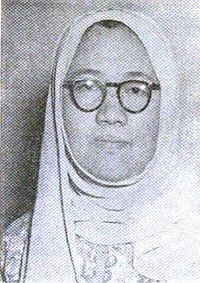Rasuna Said
Hajjah Rangkayo Rasuna Said | |
|---|---|
 | |
| Born | September 14, 1910 |
| Died | November 2, 1965 (aged 55) |
| Other names | H.R. Rasuna Said |
| Known for | National Hero of Indonesia |
Hajjah Rangkayo Rasuna Said (14 September 1910 – 2 November 1965) was a well-known Minangkabau woman leader who was active in Indonesian nationalist politics.[1] She was born in Maninjau, Agam Regency, close to the town of Bukittinggi in West Sumatra.
Rasuna Said became active in the Sarekat Rakyat (Peoples Union) organisation and later became a member of the Union of Indonesian Muslims (Persatuan Muslim Indonesia). She was imprisoned for a period for her activities by the Dutch in 1932 in Semarang in Central Java. After the proclamation of Indonesian independence in 1945 she became a member of the Sumatra Representative Council (Dewan Perwakilan Sumatra). In 1959 she was appointed a member of the Indonesian National Advisory Council (Dewan Pertimbangan Agung), a position she held until her death in Jakarta in 1965.
Rasuna Said is buried in the Kalibata Heroes Cemetery in South Jakarta.
Honors and legacy[]
Like the well-known Indonesian female leader Raden Ayu Kartini, Rasuna Said fought for equality between men and women. She was declared a National Hero of Indonesia by president Soeharto in 1974.[2]
Her name is currently used as one of the main arteries in Jakarta (Jalan H.R. Rasuna Said) and Padang, West Sumatra. An upcoming Greater Jakarta LRT station built over Jalan H.R. Rasuna Said, , is also named for her as well.
References[]
- ^ Hajjah is a title which is term of respect for women who have completed the Hajj.
- ^ Tim Gabung Ilmu, Pahlawan Indonesia & profilnya: edisi terlengkap [Profiles of Indonesian heroes; complete edition], Gedung Ilmu, Jakarta, ISBN 978 602 9080 30 8.
- National Heroes of Indonesia
- Indonesian feminists
- Minangkabau people
- People from Agam Regency
- 1910 births
- 1965 deaths
- Indonesian women in politics

